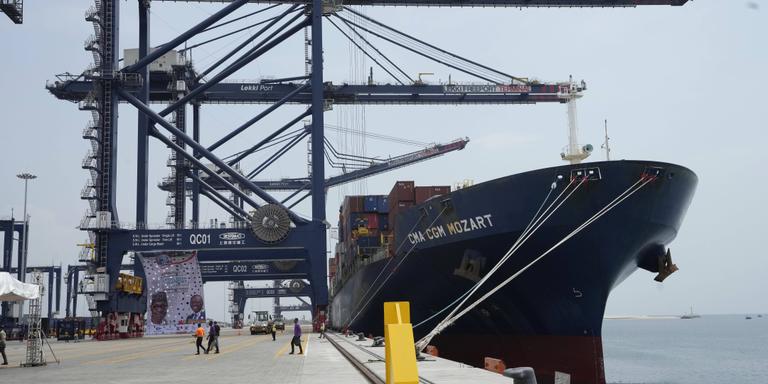


MSC, Maersk, CMA CGM: Shipping giants' quest to conquer Africa
NewsThe three maritime giants are investing massively in African ports and inland logistics, where the much less capital-intensive market is highly competitive and fragmented.
In addition to its long beaches and miles of wind-beaten coconut trees, the coastline in Côte d'Ivoire is also home to two container ports: Abidjan, the country's vibrant economic capital that serves part of the landlocked Sahel region, and San Pedro, the world's leading cocoa exporter. Since 2022, these two critical infrastructures have been in the hands of a single operator: the Swiss-Italian company MSC. That year, after flash negotiations, the world's biggest shipping company swallowed up the highly profitable African logistics activities of the Bolloré Group for the modest sum of €5.7 billion. The deal enabled MSC, which already operated the port of San Pedro, to take over the two Abidjan terminals, giving it a monopoly on containers in this key West African country.
It achieved the same result further east in the Gulf of Guinea, in Lomé, Togo, where MSC now operates the two container terminals of this hub, which recently propelled itself to the number-one position in the sub-region.
With this acquisition, the Geneva-based group enjoys a new status on the continent. MSC had 8,000 employees in Africa (with its subsidiaries TIL for terminals and Medlog for logistics), while Bolloré Africa Logistics (BAL, now AGL for Africa Global Logistics) had 21,000 employees at the time of the takeover. Abidjan, Lomé... but also Dakar, Freetown, Pointe-Noire: The group has gone from 2 to 18 container terminals, an essential growth for better serving its ships and controlling costs. It also snatched one of the continent's leading logistics networks: Railroads linking Côte d'Ivoire to Burkina Faso, a vital corridor for the Sahel region; dozens of dry ports and warehouses, including 70,000 square meters of dry and cold storage in Côte d'Ivoire alone.
'War chest'
Less spectacular than the colossal port infrastructures with their immense cranes serving the giants of the seas, logistics assets are nonetheless crucial to shipowners' strategies. "There's a battle for both the seafront and the African hinterland," a senior executive at one of the major shipowners said.
These container specialists want to offer a turnkey service, controlling the entire sea and land journey of a "box" from, say, its departure from Amsterdam to its delivery to a customer in Ouagadougou. On the continent as elsewhere, "the major shipping lines are keen to vertically integrate the value chain," an AGL source told Le Monde, adding these shipping companies had money to invest after having piled up "a war chest" during the Covid-19 pandemic when freight prices soared. In this context, the sale of the French company appeared to be a godsend, the source said.
You have 73.05% of this article left to read. The rest is for subscribers only.
